While chronic kidney disease certainly isn’t a “good” diagnosis for any dog, there are plenty of ways to manage the disease and keep Fido’s tail wagging for years to come.
Often, this includes switching to a food designed specifically for dogs with kidney issues.
Below, we’ll explain what kidney disease is, share some signs that indicate your dog’s kidneys may be struggling, and discuss some of the treatment strategies including diet adjustment. We’ll also identify some of the best dog foods for kidney disease so that your mutt can safely enjoy his munchies.
Best Food For Dogs with Kidney Disease: Quick Picks
- #1 Hill’s Kidney Care (kibble) [Best Overall Option] — Made with reduced sodium, protein, and phosphorus, this kibble is specifically designed to keep your dog nourished while being gentle on his kidneys.
- #2 Hill’s Kidney Care (canned) [Best Canned Option] — The canned version of Hill’s K/D recipe, this food provides most of the benefits the kibble version does, while also helping to keep your pooch hydrated.
- #3 Royal Canin Veterinary Diet Renal Support [Most Affordable Option] — Most good foods for dogs with kidney issues are pretty expensive, but Royal Canin’s kidney-friendly formula is a bit more affordable than the others, while still providing the kidney-supporting features most similar recipes do.
It’s important to work with your vet if you suspect your dog is suffering from kidney issues.
Not only will you need your vet to help monitor and treat the problem, but you’ll also need your vet to provide a prescription or authorization to obtain a kidney-friendly food.
What Is Kidney Disease in Dogs?
Your dog’s kidneys operate as a filtration system and help keep his body in balance. This includes executing a whole range of tasks, but some of the most important include:
- Filtering Waste from the Bloodstream — The kidneys work to remove waste from the bloodstream, and then dispose of these wastes via your dog’s urine.
- Maintaining Water and Mineral Concentration Levels — Kidneys help maintain a balance of salt and water in the body. For example, if your dog’s body fluids are currently too diluted, the kidneys may signal the body to excrete more urine.
- Controlling Blood Pressure — Kidneys partially maintain blood pressure by aiding in calcium metabolism, maintaining appropriate phosphorus levels, and adjusting the amount of water in the body.
- Manufacturing Some Hormones — The kidneys produce hormones that encourage red-blood-cell production which helps carry oxygen throughout the body.
Kidney disease occurs in two different ways: acute kidney disease (or kidney failure) and chronic kidney disease.
Acute kidney failure usually occurs as a result of ingesting toxins like antifreeze (hence the importance of using pet-safe ice melts) or medications. This can cause an abrupt decline in kidney function.
Chronic kidney disease, on the other hand, develops slowly and presents itself more over time. It can be caused by a variety of genetic and environmental factors (more on this below).
Both types of kidney disease warrant veterinary attention, but while chronic kidney disease will require long-term efforts to address, acute kidney disease is a medical emergency that can be fatal and requires immediate treatment.
Characteristics of Foods for Dogs with Kidney Disease
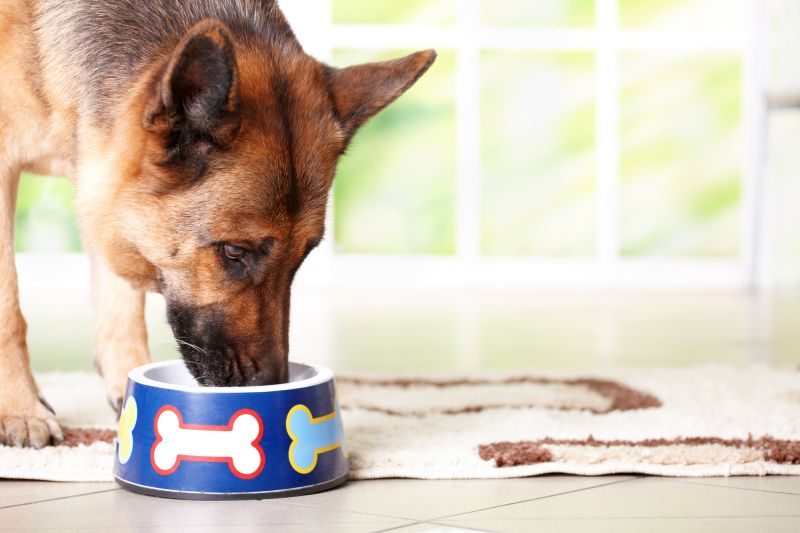
There are a couple of key guidelines to keep in mind when finding food for a dog with kidney issues. Keep in mind that all foods designed to treat kidney disease that are currently on the market require veterinary authorization.
Here are a couple of characteristics of foods for dogs with kidney disease.
- They’re typically lower in protein. These foods are usually lower in protein content which reduces the strain on the kidneys, which must filter out protein waste products. This can help preserve kidney function and prevent further damage. The recommended protein range for dogs with kidney disease is less than or equal to 14 to 20 percent on a dry-matter basis.
- Kidney-supporting foods feature reduced salt content. Sodium and salt levels are reduced in foods specialized for kidney issues as this reduces the workload on the kidneys. In addition, it can help affected doggos maintain a reasonable blood pressure level.
- Kidney-supporting foods feature reduced phosphorus. Though it’s reasoning is unclear, limiting the amount of phosphorus along with protein in a dog’s diet can help delay the progression of chronic kidney disease. The recommended phosphorus content for dogs suffering kidney disease is somewhere between 0.2 and 0.5 percent on a dry-matter basis.
- The best kidney-friendly foods contain plenty of omega-3s. Omega-3 fatty acids can help reduce inflammation which can ease the progression of chronic kidney disease.
Note that it is often wise to consider wet or canned options for dogs with kidney disease.
Dogs suffering from kidney disease need more water than healthy doggos, so you’ll not only want to encourage your dog to drink lots of water (you can attempt this through the use of a dog water fountain), you may want to give your dog a food with much greater water content too, like a quality canned wet food.
It is important to understand that there simply aren’t that many kidney-friendly dog foods on the market.
Accordingly, we’ve had to recommend a few that don’t meet the criteria we typically impose on foods we recommend.
In some cases, this is the result of the foods’ specific goals. For example, several kidney-supporting dog foods feature very low protein levels or proteins that are situated farther down the ingredient list than we’d like. This is unavoidable to an extent, as kidney-friendly foods must have reduced protein content.
However, there are also foods listed below that feature incompletely labelled by-products and other animal-based foods.
We’d normally avoid recommending such foods, but because there are only a handful of foods available for dogs with kidney ailments, we have no choice but to include them here.
Best Dog Foods for Kidney Disease
Here are some of the best food options for dogs with kidney disease on the market. Keep in mind that every dog is different, so you’ll want to work with your vet to find the best solution for your Buddy. Plus, all of these foods require a prescription.
1. Hill’s Prescription Diet — K/D
This is a sponsored placement, in which an advertiser pays a fee to be featured in this article. Learn more
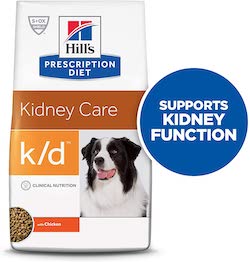
Hill’s Prescription Diet — K/D
Kidney-friendly recipe from the #1 veterinarian-recommended brand
About: This prescription food from Hill’s is made in the USA and formulated to nourish dogs without taxing their kidneys. Formulated with reduced sodium and phosphorus, this recipe is appropriate for all breeds and dog sizes.
A clinically tested food, Hill’s K/D recipe also helps to stimulate your doggo’s appetite and provide him with the amino acids he needs to maintain his body weight and build muscle.
Features:
- Reduced phosphorus levels to make things easier on your pet’s kidneys
- Low sodium recipe helps reduce kidney strain and blood pressure
- Enhanced Appetite Trigger (EAT) technology helps encourage your doggo to eat
- 12% minimum crude protein
- Veterinary authorization required
Ingredients List
Brown Rice, Brewers Rice, Pork Fat, Cracked Pearled Barley, Chicken...,
Egg Product, Dried Beet Pulp, Whole Grain Sorghum, Corn Gluten Meal, Chicken Liver Flavor, Soybean Oil, Fish Oil, Calcium Carbonate, Lactic Acid, L-Lysine, Pork Liver Flavor, Potassium Chloride, Potassium Citrate, DL-Methionine, vitamins (Vitamin E Supplement, L-Ascorbyl-2-Polyphosphate (source of Vitamin C), Niacin Supplement, Thiamine Mononitrate, Pyridoxine Hydrochloride, Calcium Pantothenate, Riboflavin Supplement, Vitamin A Supplement, Vitamin B12 Supplement, Biotin, Folic Acid, Vitamin D3 Supplement), L-Threonine, Choline Chloride, Iodized Salt, Taurine, Magnesium Oxide, minerals (Ferrous Sulfate, Zinc Oxide, Copper Sulfate, Manganous Oxide, Calcium Iodate, Sodium Selenite), L-Carnitine, L-Tryptophan, Mixed Tocopherols for freshness, Natural Flavors, Beta-Carotene.
Pros
- Reduced sodium and phosphorus levels are gentle on your dog’s kidneys
- Several owners reported improved health and energy level
- Appetite-stimulating recipe with extra amino acids helps your dog build muscle and maintain body weight
Cons
- Less-than-ideal ingredient list, with chicken listed fifth
- Contains a few relatively low-quality grains (such as brewer’s rice)
2. Blue Buffalo Natural Veterinary Diet KS
This is a sponsored placement, in which an advertiser pays a fee to be featured in this article. Learn more
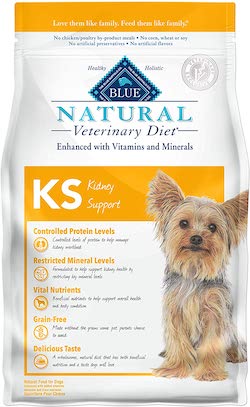
Blue Buffalo Natural Veterinary Diet KS
Grain-free, kidney-supporting, veterinary-grade diet
About: Blue Buffalo’s KS Recipe features reduced protein levels and mineral content to help make things easy on your pup’s kidneys. And unlike some other kidney-friendly diets, this food features deboned chicken as its first ingredient, making it a tasty pick for most dogs.
This food also has added taurine (which may be important for grain-free foods), omega-3 fatty acids to reduce inflammation, and other essential nutrients to keep Fido feeling his best.
Features:
- Reduced levels of calcium, phosphorus, and sodium to support kidney health
- Infused with Omega-3s, L-carnitine, and antioxidants to support overall health
- 14% minimum crude protein
- The food is made without corn or soy for sensitive stomachs
- Veterinary authorization required
Ingredients List
Deboned Chicken, Potato Starch, Pea Starch, Peas, Potatoes...,
Dried Egg Product, Chicken Fat (preserved with Mixed Tocopherols), Flaxseed (source of Omega 3 and 6 Fatty Acids), Powdered Cellulose, Natural Flavor, Fish Oil (source of DHA-Docosahexaenoic Acid), Pea Protein, Potassium Citrate, Calcium Carbonate, Dehydrated Alfalfa Meal, Dried Chicory Root, Dried Kelp, Taurine, Pea Fiber, Alfalfa Nutrient Concentrate, Turmeric, Choline Chloride, Vitamin E Supplement, Sweet Potatoes, Carrots, Zinc Amino Acid Chelate, preserved with Mixed Tocopherols, L-Carnitine, Iron Amino Acid Chelate, L-Threonine, L-Tryptophan, DL-Methionine, Vegetable Juice for color, Salt, Blueberries, Cranberries, Barley Grass, Parsley, Yucca Schidigera Extract, Copper Amino Acid Chelate, Manganese Amino Acid Chelate, Niacin (Vitamin B3), Calcium Pantothenate (Vitamin B5), Biotin (Vitamin B7), L-Ascorbyl-2-Polyphosphate (source of Vitamin C), L-Lysine, Vitamin A Supplement, Zinc Sulfate, Ferrous Sulfate, Thiamine Mononitrate (Vitamin B1), Riboflavin (Vitamin B2), Vitamin D3 Supplement, Vitamin B12 Supplement, Pyridoxine Hydrochloride (Vitamin B6), Calcium Iodate, Dried Yeast, Dried Enterococcus faecium fermentation product, Dried Lactobacillus acidophilus fermentation product, Dried Aspergillus niger fermentation extract, Dried Trichoderma longibrachiatum fermentation extract, Dried Bacillus subtilis fermentation extract, Copper Sulfate, Folic Acid (Vitamin B9), Manganese Sulfate, Sodium Selenite, Oil of Rosemary.
Pros
- Impressive ingredient list for a kidney-supporting food
- Fortified with five probiotic strains to promote digestive function
- Added taurine may help offset some problems associated with grain-free foods
Cons
- Despite featuring supplemental taurine, we’d prefer if it were a grain-inclusive recipe
3. Purina Pro Plan Veterinary Diets NF
This is a sponsored placement, in which an advertiser pays a fee to be featured in this article. Learn more
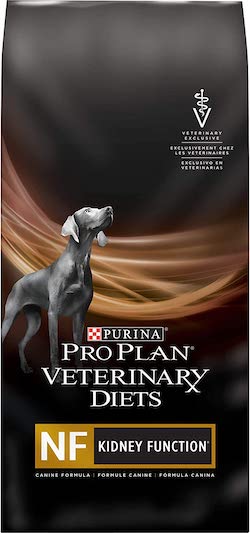
Purina Pro Plan Veterinary Diets NF
Reduced-sodium, low-protein recipe for dogs with kidney disease
About: This food by Purina Pro Plan is designed to support your canine’s kidneys, while still providing the nutrition you’d want and a great taste he deserves. Like most other kidney-friendly formulas, this food features reduced sodium, phosphorus, and protein content.
A grain-inclusive recipe, this dry food is packed with vitamins and antioxidants to promote immune health, and features flavor-boosting ingredients like liver flavor.
Features:
- 12.5% minimum protein content
- Limited sodium content to support kidney health
- Pea-free formula with restricted phosphorus concentration
- Features healthy antioxidants and added vitamins
- Veterinary authorization required
Ingredients List
Whole Grain Corn, Brewers Rice, Dried Egg Product, Animal Fat Preserved With Mixed-Tocopherols, Sugar...,
Dried Whey, Sodium Caseinate, Animal Liver Flavor, Calcium Carbonate, Vegetable Oil, Potassium Chloride, L-Lysine Monohydrochloride, Fish Oil, Salt, Potassium Citrate, Mono And Dicalcium Phosphate, Vitamin E Supplement, Choline Chloride, Zinc Sulfate, Ferrous Sulfate, Niacin (Vitamin B-3), Manganese Sulfate, Vitamin A Supplement, Calcium Pantothenate (Vitamin B-5), Thiamine Mononitrate (Vitamin B-1), Vitamin B-12 Supplement, Copper Sulfate, Riboflavin Supplement (Vitamin B-2), Pyridoxine Hydrochloride (Vitamin B-6), Garlic Oil, Folic Acid (Vitamin B-9), Menadione Sodium Bisulfite Complex (Vitamin K), Vitamin D-3 Supplement, Calcium Iodate, Biotin, Sodium Selenite
Pros
- Several owners reported improved kidney function after switching to this food
- Most dogs appear to love the taste
- Includes fish oil, which is rich in omega-3 fatty acids
Cons
- Minimal animal-based protein content
- Kibble size is very small, which may cause issues for big dogs
- Includes incompletely labelled ingredients (such as “animal fat” and “animal liver flavor”)
4. Royal Canin Veterinary Diet Renal Support
This is a sponsored placement, in which an advertiser pays a fee to be featured in this article. Learn more
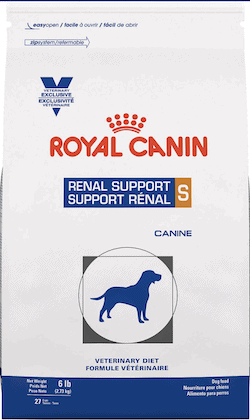
Royal Canin Veterinary Diet Renal Support
Low protein kibbles perfect for dogs with kidney issues
About: Royal Canin is well known for producing specialty kibbles, such as this Renal Support Recipe. Formulated with reduced protein and phosphorus content, this food is designed to provide the nutrition your dog needs while being gentle on his kidneys.
This recipe also features omega-3-rich ingredients to help combat inflammation, and it is specifically designed to taste great and tempt dogs whose appetites aren’t as strong as they once were.
Features:
- Low protein formula to ease kidney workload
- Designed to provide suitable nutrition in smaller portion sizes
- Added Omega-3-rich ingredients
- 10.5 to 14.5% minimum crude protein content
- Veterinary authorization required
Ingredients List
Corn, Brewers Rice, Chicken Fat, Brown Rice, Chicken By-Product Meal...,
Natural Flavors, Dried Plain Beet Pulp, Wheat Gluten, Fish Oil, Calcium Carbonate, Psyllium Seed Husk, Sodium Silico Aluminate, Potassium Chloride, Salt, L-Lysine, Fructooligosaccharides, Choline Chloride, Potassium Citrate, Vitamins [Dl-Alpha Tocopherol Acetate (Source of Vitamin E), L-Ascorbyl-2-Polyphosphate (Source of Vitamin C), Biotin, D-Calcium Pantothenate, Vitamin A Acetate, Niacin Supplement, Pyridoxine Hydrochloride (Vitamin B6), Thiamine Mononitrate (Vitamin B1), Vitamin B12 Supplement, Riboflavin Supplement, Vitamin D3 Supplement, Folic Acid], Magnesium Oxide, Taurine, L-Tryptophan, Marigold Extract (Tagetes Erecta L.), Trace Minerals [Zinc Oxide, Ferrous Sulfate, Manganous Oxide, Copper Sulfate, Calcium Iodate, Sodium Selenite], Rosemary Extract, Preserved with Mixed Tocopherols and Citric Acid.
Pros
- Several owners reported improved kidney function scores after switching to this recipe
- Slightly more affordable than most other kidney-supporting options
- Most dogs — even picky ones — appear to like the taste
Cons
- Ingredient list leaves a lot to be desired (such as a whole animal protein)
- While most owners reported improved kidney function after feeding this diet, it didn’t work for all dogs
5. Hill’s Prescription Diet K/D (Canned)
This is a sponsored placement, in which an advertiser pays a fee to be featured in this article. Learn more
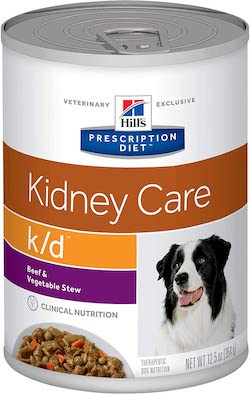
Hill’s Prescription Diet k/d (Canned)
Very low protein, kidney-friendly food with a taste dogs love
About: Hill’s Kidney Care Canned Food serves as an excellent wet food option for dogs with kidney disease. Like most other kidney-supporting diets, this food contains reduced phosphorus and sodium content, as well as very low protein content.
Despite having a very low protein content, this US-made food is made with real beef, and is specifically formulated to stimulate your pup’s appetite. The food’s high water content will also help your pooch stay hydrated, which is very important for dogs with kidney disease.
Features:
- Very low protein content of just 2.5% (minimum)
- Contains omega-3-rich ingredients to reduce inflammation
- Helps build lean muscle mass
- Enhanced Appetite Trigger (EAT) technology helps stimulate appetites
- Veterinary authorization required
Ingredients List
Water, Beef, Carrots, Rice, Chicken Fat...,
Pork Liver, Rice Starch, Dextrose, Green Peas, Sugar, Egg Whites, Chicken Liver Flavor, Powdered Cellulose, Fish Oil, Dried Beet Pulp, Flaxseed, Potassium Alginate, Caramel color, Calcium Lactate, Calcium Gluconate, Natural Flavor, Potassium Citrate, Brewers Dried Yeast, Choline Chloride, Guar Gum, Soybean Oil, L-Lysine, Calcium Chloride, Dicalcium Phosphate, vitamins (Vitamin E Supplement, Niacin Supplement, Thiamine Mononitrate, Ascorbic Acid (source of Vitamin C), Vitamin A Supplement, Calcium Pantothenate, Vitamin B12 Supplement, Biotin, Pyridoxine Hydrochloride, Riboflavin Supplement, Folic Acid, Menadione Sodium Bisulfite Complex (source of Vitamin K), Vitamin D3 Supplement), Magnesium Oxide, L-Arginine, L-Threonine, Taurine, Monosodium Phosphate, minerals (Zinc Oxide, Ferrous Sulfate, Copper Sulfate, Manganous Oxide, Calcium Iodate, Sodium Selenite), L-Tryptophan, L-Carnitine, Calcium Carbonate, Beta-Carotene.
Pros
- Contains real beef (second listed ingredient after water)
- Most owners reported improved kidney function scored
- High water content helps keep your pooch hydrated
Cons
- Like all canned foods, can be challenging to portion or store
- Even pricier than kidney-supporting kibbles
6. Purina Pro Plan Veterinary Diets NF (Canned)
This is a sponsored placement, in which an advertiser pays a fee to be featured in this article. Learn more
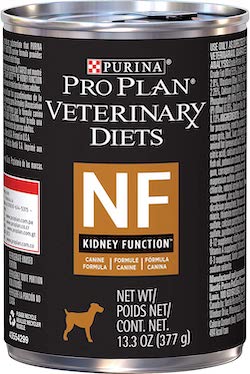
Purina Pro Plan Veterinary Diets NF (Canned)
A low-protein, kidney-supporting alternative to Purina’s kibble recipe
About: Designed specifically for dogs with kidney problems, this wet food from Purina Pro Plan contains minimal protein, as well as reduced sodium and phosphorus content. It is also made with a ton of water, which will help keep your pup hydrated, which is crucial for dogs with ailing kidneys.
In addition to these kidney-supporting characteristics, this food is fortified with antioxidants to help support your dog’s immune system.
Features:
- Very low protein content of 3.8% (minimum)
- Food has 74% moisture content, making it super hydrating
- Limited sodium and phosphorus content
- Features healthy antioxidants to support kidney and immune function
- Veterinary authorization required
Ingredients List
Water Sufficient For Processing, Meat By-Products, Rice, Corn Grits, Beef...,
Liver, Chicken By-Products, Animal Fat (Preserved With TBHQ And Citric Acid), Calcium Sulfate, Guar Gum, Fish Oil, Potassium Citrate, Locust Bean Gum, Carrageenan, Potassium Chloride, Magnesium Sulfate, Choline Chloride, Natural Smoke Flavor, Vitamin E Supplement, DL-Methionine, Zinc Sulfate, Ferrous Sulfate, Niacin (Vitamin B-3), Thiamine Mononitrate (Vitamin B-1), Calcium Pantothenate (Vitamin B-5), Copper Sulfate, Pyridoxine Hydrochloride (Vitamin B-6), Manganese Sulfate, Vitamin B-12 Supplement, Riboflavin Supplement (Vitamin B-2), Vitamin A Supplement, Folic Acid (Vitamin B-9), Vitamin D-3 Supplement, Biotin (Vitamin B-7), Potassium Iodide, Sodium Selenite
Pros
- Contains real beef (fifth listed ingredient)
- Can be used as a palate-pleasing topper for kidney-supporting kibble
- Purina offers a money-back guarantee
Cons
- Contains incompletely identified meat by-products
- Multiple proteins make it a poor choice for dogs with food allergies
Don’t have easy access to a vet? You may want to consider getting help from JustAnswer — a service that provides instant virtual-chat access to a certified vet online.
You can discuss the issue with them, and even share video or photos if need be. The online vet can help you determine what your next steps should be.
While talking with your own vet — who understands the ins and outs of your dog’s history — is probably ideal, JustAnswer is a good backup option.
What About Treats for Dogs with Kidney Disease?
While you can still give your furry best friend treats following a kidney disease diagnosis, you must make sure they’re approved for your pup’s adjusted diet. So, talk to your vet about treats when discussing your doggo’s food.
If you do get the green light, you may want to try Mattie’s Kidney Disease Dog Treats.
This is a sponsored placement, in which an advertiser pays a fee to be featured in this article. Learn more
Designed specifically for dogs with kidney problems, these treats are low in protein and phosphorus, and they’re made without wheat, corn, or soy.
Best of all, Mattie’s Treats donates a percentage of their sales to help fund research into canine kidney disease, which is a win for all pups struggling with this health problem.
Features:
- 6.8% minimal protein content
- Low protein, low phosphorus recipe
- 19 Calories per treat
- Made in the USA
- No veterinary authorization required
Ingredients List
Light rye flour, tapioca flour, pure pumpkin, cinnamon, omega 3 fish oil, canola oil...,
That’s it!
Pros
- Kidney-friendly recipe designed specifically for dogs with kidney disease
- Crunchy texture dogs love
- No corn, wheat, or soy
- Contains omega-3 fatty acids to reduce inflammation
Cons
- May be too hard for dogs with dental problems
What Causes Kidney Disease in Dogs?

As mentioned, acute kidney disease is usually caused by your dog ingesting something toxic. This could be antifreeze, ibuprofen, chemical cleaners, or anything around the house that is poisonous to dogs. One of the best ways to keep your pooch safe is to make sure that anything potentially dangerous is far from Fido’s reach.
The cause of chronic kidney disease is a little more difficult to pin down, but it can generally be attributed to one of the following factors:
- Aging process — As dogs become older, many body functions can naturally slow down. This includes activity in the kidneys, and chronic kidney disease is more likely to prevent itself later in your dog’s life.
- Underlying illness — Many underlying illnesses can be the root cause of your dog’s kidney disease, as they can compromise the body’s ability to filter out toxins.
- Dental problems — Dental issues can open the door for harmful bacteria to enter the bloodstream which can cause irreversible damage to the kidneys and other organ systems.

Additionally, congenital and hereditary diseases can lead to kidney failure. Certain dog breeds like German shepherds and bull terriers may be more prone to developing kidney diseases based on their genetic background.
Your pooch may also be predisposed to kidney complications depending on his family health history.
It’s important to see your veterinarian as soon as you notice any signs of kidney disease for a thorough diagnosis.
What Happens When a Dog Suffers from Kidney Disease?
Remember that there are both chronic and acute forms of kidney disease.
We’re primarily focusing on the chronic form here, but if your dog is showing signs of kidney disease after ingesting something toxic, he likely has an acute case that needs to be treated immediately.
In such cases, you’ll simply need to make your way to the nearest pet hospital or care facility pronto. However, chronic kidney disease is a long-term, rather than emergent problem.
As your dog ages or his chronic kidney disease progresses, he will become less capable of efficiently filtering his blood. Subsequently, his body must increase the amount of blood flowing through the kidneys to lower the concentration of toxins.
This can lead to increased water intake and a higher production of urine than normal. Your dog’s blood pressure will likely change too, though you obviously won’t notice this (there are no outward signs of high blood pressure).
Unfortunately, chronic kidney disease is typically a lifelong condition that requires permanent management under the direction of your veterinarian.
Symptoms of Kidney Disease In Dogs

It’s critical to know what to look out for when it comes to kidney disease as the acute form of the disease can be life-threatening. Even if your dog is “only” suffering from the chronic form, you’ll need veterinary guidance to ensure he stays as healthy and happy as possible.
Here are a few key signs your pooch may be suffering from kidney issues:
- Increased thirst
- Increased urination
- Depression
- Weight loss
- Decreased appetite
- Vomiting
- Bad breath
- Weight loss
- Blood in urine
- Pale gums
- Mouth sores
How Is Kidney Disease Treated in Dogs?
When you go in for an office visit, your vet will likely run a variety of tests to diagnose the problem. This may include a urinalysis to evaluate kidney function and a blood chemistry analysis to assess the function of your dog’s internal organs.
Depending on your dog’s test results, your veterinarian will recommend a variety of treatment strategies to help Fido manage his condition.

Some of the most common treatments for chronic kidney disease in dogs include:
- Switching to a Kidney-Supporting Food — As discussed earlier, most dogs with chronic kidney disease will require a specialized food that won’t cause his kidneys to work harder than they have to.
- Medications — Your veterinarian may prescribe various medications to manage the symptoms associated with the kidney issues at hand. This may include medications to help the body eliminate phosphorus, reduce stomach acid, control blood pressure, prevent vomiting, stimulate red blood cell production, or regulate the parathyroid gland which controls calcium levels in the bloodstream.
- Supplements — Your vet may also recommend adding some supplements to Fido’s daily diet. This may include potassium supplements which can help regulate blood pressure.
- IV Fluids — Your pooch might be given intravenous fluids to help flush out the kidneys and bloodstream. This process helps remove toxic metabolites from his blood stream. The procedure can also replenish vital electrolytes like potassium.
- Treating the Underlying Issue — Since kidney issues are often a result of another underlying problem, your veterinarian will work to root out any associated ailments that may be overwhelming your dog’s kidneys.
Dog Kidney Disease FAQs
Supporting Spot following a kidney disease diagnosis can be challenging. Here are a couple of the most common kidney disease questions owners often have, with answers to help you maintain your mutt’s health.
What is the best food for dogs with kidney disease?
Ultimately, this depends on the individual needs of your dog. Since every pooch is different, it’s best to take this up with your veterinarian to find the best food for Fido.
However, you’ll likely find that your vet recommends one of the foods discussed above.
Is kidney disease painful for dogs?
Kidney disease and its associated symptoms can be extremely painful for your pooch. As soon as you suspect an issue, it’s vital to see your veterinarian. Your pet care professional can help you come up with a treatment plan to keep your four-footer as comfortable as possible.
How long can a dog live with kidney disease?
This answer largely depends on the stage of your dog’s kidney disease. Generally speaking, the earlier you catch the condition, the better chance you have of prolonging your pup’s life.
What are the signs of kidney disease in dogs?
Some signs of kidney disease in dogs include lethargy, weight loss, pale gums, bad breath, and increased or decreased water intake.
You might also notice a change in your dog’s urine volume. Be sure to give your vet a call whenever your pooch is exhibiting any of these symptoms.
What human food can I feed my dog with kidney disease?
While there are dog-safe human foods you can share with most pups, you’ll need to run any treat by your veterinarian to make sure it fits within your dog’s kidney disease treatment plan. Don’t forget that dogs with kidney disease should have limited sodium, protein, and phosphorus intake.
What foods help repair a dog’s kidneys?
Unfortunately, you can’t fully repair kidneys, only support their future health. That being said, foods rich in omega-3 fatty acids can reduce inflammation and slow the progression of canine kidney disease.
What foods should dogs with kidney disease avoid?
Any dog with kidney disease should avoid foods high in sodium, protein, or phosphorus. More importantly, anything your dog consumes should be vetted by your vet to make sure it’s a good fit for his needs.
Why do dogs get kidney disease?
Dogs can get acute kidney disease from consuming something toxic like medication or antifreeze. Chronic kidney disease can be caused by a variety of genetic and environmental factors.
Is kidney disease fatal in dogs?
Kidney disease that’s managed under the care of a veterinarian isn’t necessarily fatal for dogs though it can, unfortunately, shorten your dog’s lifespan. If left unaddressed, acute and chronic kidney disease can be fatal.
Can dogs get a kidney transplant?
While pooch kidney transplants are possible, they are difficult to come by and extremely costly. Testing is somewhat limited and a kidney transplant study out of the University of California reported a risky 36% success rate. Unfortunately, even if your dog undergoes a successful transplant, they’ll likely have to take medications for the rest of his life.
***
Under the direction of a pet care professional, pups with kidney disease can still maintain an enriching, fulfilling lifestyle. Make sure you speak to your veterinarian about the best way to transition your furry best friend to a kidney-friendly kibble or wet food before making the switch.
Has your pooch had success with any of these prescription foods? How do you enrich your mutt’s mealtime? We’d love to hear all about your experience in the comments below!
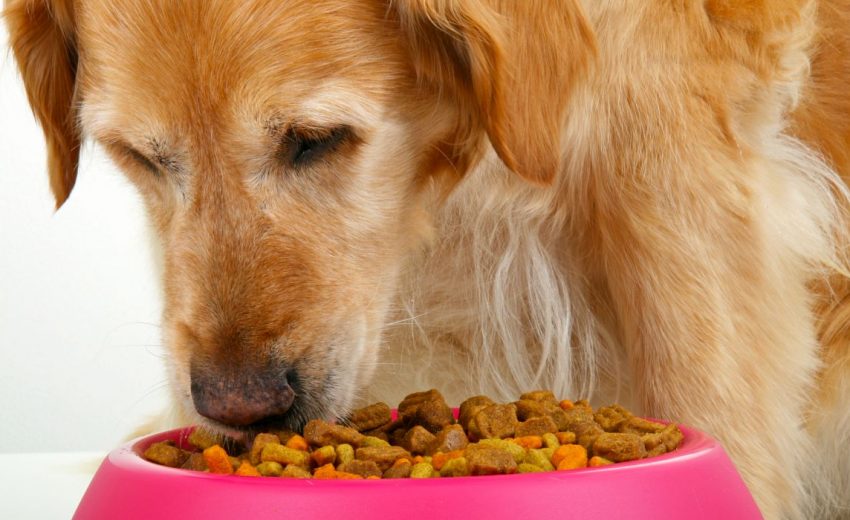
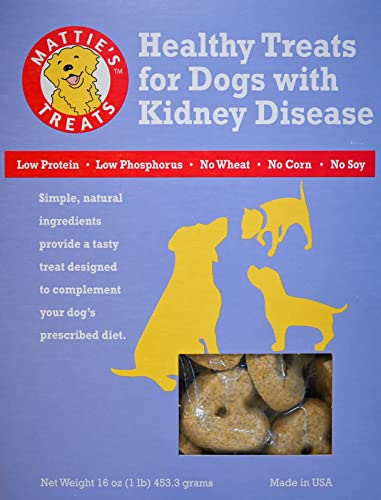




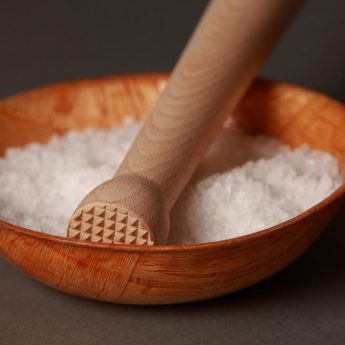


9 Comments
January 23, 2023
This kidney advice is about as bad as it gets. The carb filled, moisture deprived, nutrient lacking junk food equivalent food recommended here are terrible. With so much info out there about the benefits of real food and the detriment of this processed foods I am not sure how you can feel good about promoting these foods. Dogs don’t thrive like they can with real food which is also in part why there is more and more of a push for real food for our pets. If you are truly trying to help pets live a better, longer life, you should research for yourself and do so with unbiased paid for play research used by these food industry goliaths that aren’t out to help pets be healthier but instead line their pockets at the demise of our pets. This is wrong and you are perpetually their wrong doings by promoting their products.
January 24, 2023
Hey there, Odette.
We appreciate you checking out the site and sharing your thoughts, but we stand behind our recommendations.
Check out our article about how to pick a dog food if you’d like to learn more about canine nutrition.
Thanks!
August 19, 2021
My little yorkie is 10 stage 3 kidney failure. When diagnosed he was 6lbs. 7 oz now he is 5.5 lbs. he lost 1/2 lbs. in 3 weeks. I can’t get him to eat day two of not eatingwhat can I feed him. He’s on all kinds of meds and subcutaneous fluids every second day. Please help. One day he’ll eat the food next day he won’t.
August 19, 2021
Hey, Anna.
We’re truly sorry to hear about your pooch’s struggles! And half a pound of weight loss in such a tiny terrier is certainly concerning.
However, because of his medical issues, this is really a question for your vet.
If he was healthy and you were just trying to get him to eat something, we’d recommend all of the typical things (some cooked chicken or beef, bits of cheese, dog-safe peanut butter, cooked white rice, etc.).
But given his issues and nutritional needs, you’ll need to run these things by your vet first.
Best of luck! Sorry we couldn’t be of help.
August 8, 2021
Thank you for writing such a helpful article. I just found out that Maggie has CKD. She is 11yrs old. I am fortunate she is asymptomatic and pray that continues until I can get a handle on lowering her kidney values, by changing her food. I do not want to place her on meds, she is already on seizure meds. Seizures came out of no where and started winter 2020. Thank you again for helping our fury loved ones. Annemarie
August 9, 2021
Happy to help, Annemarie!
Best of luck with your pooch.
August 5, 2021
good
July 22, 2021
Looking for a tiny kibble for my Chihuahua-the Purina is too big. Any of these other brands come in a smaller size?
July 22, 2021
Hey there, Tonisa. Not sure if this helps, but the Blue Buffalo kibble was described by one owner as “Cheerio-sized.”
Best of luck!